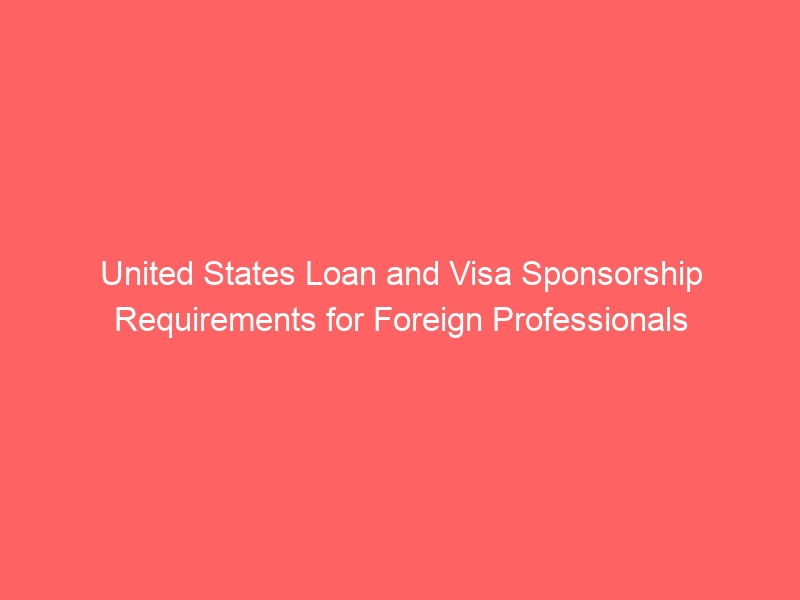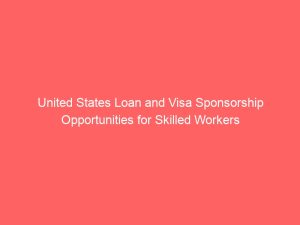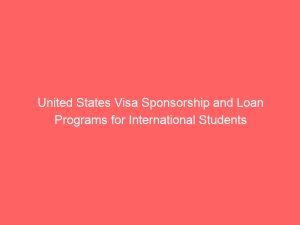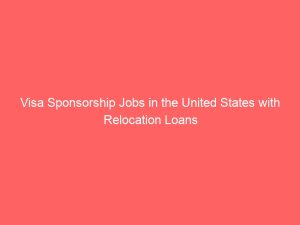For many foreign professionals, the United States represents a land of opportunity where career growth, high wages, and global exposure are possible. However, transitioning to work in the U.S. requires navigating two crucial areas: securing the right visa sponsorship and understanding the requirements for obtaining loans. While visa sponsorship enables you to legally work in the country, access to loans ensures you can meet financial needs such as relocation, housing, education, or business ventures. This guide will provide an in-depth look at the requirements for both, helping foreign professionals prepare effectively.
Understanding Visa Sponsorship in the United States
Visa sponsorship occurs when a U.S.-based employer agrees to employ and support a foreign worker by filing the necessary paperwork with U.S. immigration authorities. The employer essentially takes responsibility for ensuring the worker’s visa is approved and complies with all legal requirements. In most cases, the employer also demonstrates that no qualified U.S. citizen is available to fill the position.
Common Visa Types for Foreign Professionals
- H-1B Visa – For skilled professionals in fields such as IT, engineering, healthcare, and finance. Requires a job offer from a U.S. employer.
- L-1 Visa – For intra-company transfers where a foreign professional is moved from a company branch abroad to the U.S. branch.
- O-1 Visa – For individuals with extraordinary ability in sciences, arts, education, or business.
- EB-2 and EB-3 Visas – Employment-based green card categories for skilled workers and professionals.
- TN Visa – Available to Canadian and Mexican citizens under NAFTA for certain professional occupations.
Basic Visa Sponsorship Requirements
- Job Offer: A formal employment offer from a U.S. employer willing to sponsor your visa.
- Labor Certification (if required): Proof that no qualified U.S. citizen is available for the role.
- Educational Qualifications: Relevant degrees, certifications, and experience.
- Proof of Skills: Demonstrated ability through portfolios, references, or tests.
- Compliance with Immigration Laws: No immigration violations or criminal history.
Loan Opportunities for Foreign Professionals in the U.S.
Many foreign professionals need financial support to cover relocation, housing, or education costs in the United States. While obtaining loans as a non-U.S. citizen can be challenging, there are several options available, particularly if you have a valid visa and a job.
Types of Loans Available
- Personal Loans – Can be used for various expenses such as settling in the U.S., buying a car, or covering emergencies.
- Auto Loans – Designed for purchasing vehicles; available from banks and dealerships.
- Housing Loans (Mortgages) – For buying a home; lenders require proof of income and visa validity.
- Education Loans – For foreign professionals pursuing advanced degrees or certifications in the U.S.
- Business Loans – For those starting or expanding a business; may require strong business plans and collateral.
Loan Eligibility Requirements
- Valid Visa Status: Lenders require proof that your visa allows you to work and stay in the U.S. for the loan term.
- Employment Verification: Proof of income, job stability, and an employment contract.
- Credit History: U.S. credit history is preferred, but some lenders accept international credit reports.
- Proof of Residence: A valid U.S. address.
- Down Payment (if applicable): For mortgages or auto loans.
Challenges Faced by Foreign Professionals
- Limited Credit History – Many foreign workers arrive without a U.S. credit score, making loan approval difficult.
- Visa Expiry Concerns – Lenders may hesitate to approve long-term loans if your visa is near expiration.
- High Interest Rates – Without established credit, interest rates may be higher.
- Strict Employment Verification – Lenders and immigration authorities require clear proof of employment.
How to Increase Your Chances of Loan Approval
- Build Credit Early: Open a secured credit card or a small loan to establish a U.S. credit history.
- Maintain Steady Employment: Job stability improves your loan eligibility.
- Work with International-Friendly Lenders: Some banks and credit unions specialize in loans for visa holders.
- Show Proof of Assets: Demonstrating savings or property can reassure lenders.
- Choose Shorter Loan Terms: Shorter repayment periods reduce risk for lenders.
How Visa Sponsorship and Loans Interconnect
Securing a visa sponsorship not only allows you to work legally but also plays a vital role in your financial standing. Lenders prefer borrowers with stable, long-term employment—something that visa sponsorship provides. Employers offering multi-year sponsorship contracts indirectly help you qualify for larger or longer-term loans.
For example, if you have an H-1B visa valid for three years with a renewable option and a steady job, you are more likely to secure a housing loan compared to someone on a visa expiring in six months.
Steps to Secure Visa Sponsorship and Loans
- Research Employers: Target companies known for sponsoring visas in your profession.
- Prepare a Strong Resume: Highlight relevant skills, experience, and achievements.
- Apply for Positions with Sponsorship Potential: Use job portals that filter for “visa sponsorship available.”
- Secure a Job Offer: Ensure the employer is aware of the sponsorship process.
- Apply for a Visa: Work with your employer’s HR or immigration lawyer.
- Establish U.S. Banking and Credit: Open an account and start building credit immediately upon arrival.
- Identify Suitable Lenders: Approach banks, credit unions, and online lenders with experience working with foreign professionals.
- Submit Loan Applications: Provide all necessary documents, including visa details, proof of income, and residence.
Tips for Long-Term Success
- Keep Visa Status Updated: Always renew on time to maintain employment and loan eligibility.
- Save for Emergencies: Build a financial cushion to cover unexpected expenses.
- Diversify Income: If possible, have multiple income streams to improve financial stability.
- Network Professionally: Connecting with other foreign professionals can lead to better job and loan opportunities.
- Plan for Permanent Residency: Transitioning from a temporary visa to a green card strengthens your financial position and access to loans.
Conclusion
Foreign professionals moving to the United States face both exciting opportunities and significant challenges. Understanding the requirements for visa sponsorship and loans is crucial to ensuring a smooth transition. With proper preparation, stable employment, and a strategic financial approach, you can build a successful career and life in the U.S. Visa sponsorship gives you the legal pathway to work, while loans provide the financial support to achieve personal and professional goals. By following the guidelines in this article, you can confidently navigate both systems and maximize your potential as a foreign professional in the United States.




